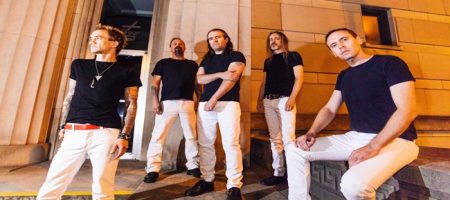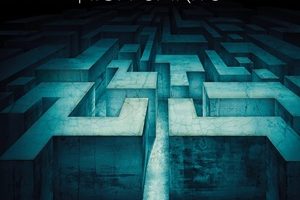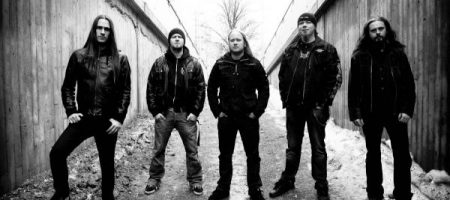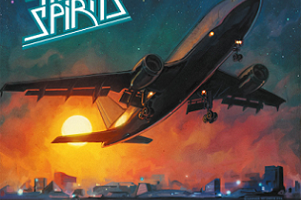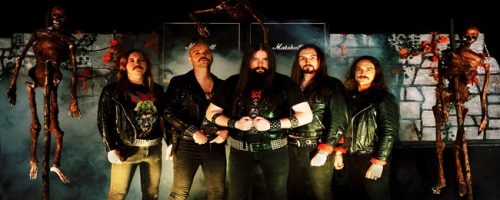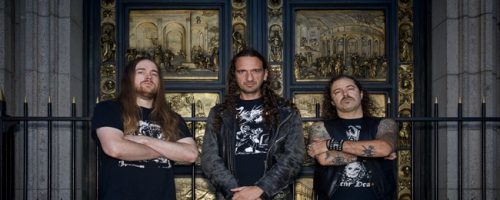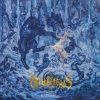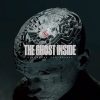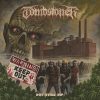High Spirits – Ever Present
Tuesday, 14th July 2020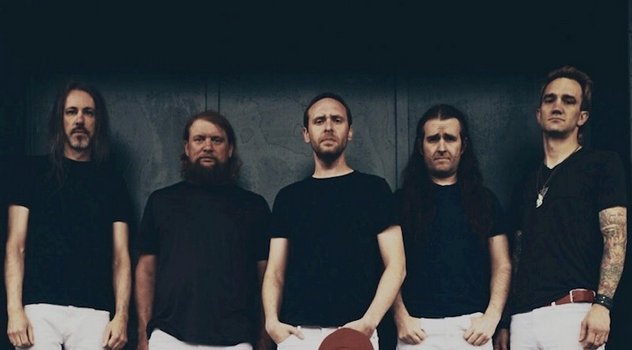
Eleven years into High Spirits, the good times still roll in the hands of Chris Black. He’s been able to deliver endearing anthems chock full of memorable melodies and catchy choruses that go down a storm from Chicago to London, Providence to Berlin and beyond. His vision and insight capture the hearts of heavy metal fans worldwide – and that will continue through the work of the fourth album Hard to Stop. This time around aspects of Iron Maiden, Thin Lizzy, UFO, and others in that 70’s/80’s influence tree filter into these nine songs, with stronger, more confident guitar parts than ever before.
We reached out to Chris to learn as much as possible regarding the songwriting process for this effort, his thoughts on Dan Swanö who mixed the record, the state of heavy metal in 2020, and what the future holds in this chaotic world including his plans for a special metal biography book.
Dead Rhetoric: The fourth full-length album for High Spirits is Hard to Stop. Tell us about the songwriting and recording process this time around – and where do you see this collection of songs sitting in the discography of the band?
Chris Black: The second part of that is hard to answer, kind of in the heat of the moment. With the album just about to come out, we don’t really just yet know how the audience is going to react. And more importantly, other than “Midnight Sun”, we haven’t played any of these songs live on stage, so we haven’t been able to kind of see what those bonds are going to be. To rank it within the back catalog, that’s a hard thing to do.
The writing and recording process was the same as it has been. With me working by myself and rolling off a body of songs and song ideas that I have. Transforming those (songs) into the best High Spirits album that I can make right now. It sounds simple to say so, but it’s always the objective to write the best songs and make the best album that I can. What was different this time around is the mix was done after I recorded everything at my home studio, I handed it over to Dan Swanö to do the mixing. And he brings a lot to the game, had a lot of experience in the recording studio pretty much with every kind of metal band that you can think of, and bands that aren’t metal as well. I knew he would bring a lot to the process and the sound, which he definitely did. That was markedly different about the process, which was bringing Dan in.
Dead Rhetoric: As you’ve been recording these albums by yourself, do you believe you’ve improved as a guitar player? Because I know you naturally enjoy playing the drums and bass…
Black: I think you’re exactly right about the drums especially and more recently bass being more of my lead instruments that I feel natural holding and playing. That’s never been the case with the guitar. I think I’ve gotten better, the melodies and solos that I’ve played more recently are definitely an improvement compared to the first couple of High Spirits recordings. Not that they are bad, they are just very limited with the range of motion. I relied on the same bag of licks overly, that was all I really could do. It was a matter of the ideas and executing them. I’m not a guitar player so it was hard for me to think like a guitar player, I would think of a melody and see if it was playable at all. Making some incremental improvements – I don’t think I’ll ever be comfortable playing the guitar on stage – that’s still a ways off.
Dead Rhetoric: Some of my favorite tracks this time around include the UFO-like “Face to Face” and the Iron Maiden-ish follow-up “Hearts Will Burn”. For as many ideas that develop, how critical are you personally to making sure that each song measures up to a high standard for High Spirits?
Black: I am critical. They do have to have that certain right feeling. It has to pass a certain filter and test to be a High Spirits song and be the best it can be. I am very critical, I work hard and try a lot of ideas that don’t end up working out. At least I gave them a try, and that’s the biggest advantage to recording in your own studio, in your own environment, on your own time is you have the opportunity to try out all your ill-advised, two in the morning, eyes about to fall out ideas that you might have just to see what they sound like. Of course the cliché ends up being true a lot of the time, you had it right the first time and you end up wasting time trying things twenty other ways.
Dead Rhetoric: Are you also enjoying the mix of recording EP’s as well as full-lengths, is that a spontaneous process when that occurs?
Black: Yeah, I would say it is. In the case of the most recent High Spirits EP Escape, that was recorded when it was in order to have something new to support on tour in Europe. I think that was in 2017 or 18, when that came out. Now was the time to look at the songwriting that may be in reserve, and one song on there would have gone on Motivator, had it not been so similar to other stuff on that album. It wasn’t because it sucked that we never recorded it earlier.
It can be fun to work on an EP. It’s a smaller workload, so you don’t get as burned out as you would with a full-length album. It’s a shorter process doing an EP or a single.
Dead Rhetoric: You sought out Dan Swanö to mix this record. There are interesting parallels between his prolific output in numerous genres of metal/hard rock and yourself – what do you think he was able to add to make this record that much stronger, and how do you view his importance as a musician, producer, and overall person?
Black: What he brings to the game in a word is experience. He’s been playing multiple instruments his whole life. He has been making recordings of himself for almost as long, in addition to recording other bands, going back to the early 90’s. And he never really stopped, to my knowledge he’s always been working, always been someone keeping up to date with recording technology as it’s evolved quite rapidly over the last couple of decades. As far as I can tell he’s never been stubborn to just stick with what’s worked in the past, he wants to evolve and stay very current as far as the gadgets and the gizmos that have been developed more recently.
I had a gut feeling that he would be very easy to work with, and that we kind of speak the same languages. He’s done a lot of death metal, black metal, the first couple of Opeth records, the list just goes on and on. When you look at the entirety of it it’s really quite a range of genres, range of music, a range of vocal styles and vocalists that he’s worked with. Not to mention his own versatility. I just thought that the breadth of his experience would be something to again make this album the best it could be, and he got it. He required very little direction from me, even off the bat. He was really close the first time around, and we just built from there.
Dead Rhetoric: Can you describe the simpler cover art aesthetic for the new record this go around – and how it ties into the philosophy and outlook of High Spirits in general?
Black: This was really hard this time. We tried, at least a dozen to fifteen different various ideas. A lot of them really cool but they only embodied one musical aspect of the album, if that makes sense. Hard to Stop has a wide range of tempos and atmospheres, emotional characteristics of the songs. It was very hard to find one image that tied it all together. We played around with images that would be great for these two or three songs, but this other one is just right for this particular song. And finally, we just stumbled across that image- it’s perfectly simple, it’s motion, and it’s open to interpretation. At a glance it almost looks celestial and looks like a comet or something, but if you look more closely it’s just a fancy photo of a car’s headlights in the dark. It’s a cool, catchy kind of image that successfully relates to the entirety of the album, rather than just a handful of songs.
Dead Rhetoric: Did you ever imagine High Spirits to have such a strong impact on an international scale, where it would be a viable, touring entity stateside and overseas including playing numerous prestigious festivals? At what point in the band’s career arc did you know you were making an impact and a deeper connection with your growing number of fans/followers?
Black: The answer to the first part is no. I had no idea, nor did we really plan or aim for the type of success that we’ve had as a recording artist, and as a live band too. It all caught us by surprise, we were prepared to say yes to certain opportunities and certain ideas that came to us early on. We had some touring experience from other bands we had been involved in so we hit the ground running and got out on the road a little bit before the first album came out – do little tours in the US. It wasn’t part of anything we planned, I hadn’t even planned for this to be a touring band or a live band at the onset. It was because there was a particular show that somebody offered us – we called around to see who might up for doing this.
I think if there was a moment for me personally it was when we played the first small show in Europe, in Germany the day after we had played the Rock Hard Festival. It was our first overseas show and a big deal, so big and not what we had really planned for and expected. We show up, and it was a dream like we had wandered into some other band’s gig. The day after that we played a small club, it was packed. One hundred people nose to nose, everybody sweating and everybody knew the songs. We were so far away from home and it’s like we were playing our favorite place in Chicago, the interaction with the audience. It was that moment where I saw that this was something bigger than us, any one person in the room right now.
Dead Rhetoric: Where do you see the state of heavy metal in 2020? What fascinates you and pleases you, and what areas of concern do you think need to be addressed either on a short-term or long-term basis for the safety and sanctity of the genre?
Black: That’s a heavy question. I’m not sure what I think of the state of heavy metal. The state of heavy metal hasn’t changed that much for me personally. I’m still tied to the same favorites that I was twenty years ago or more. Heavy metal has been very consistent for me, it’s steady in my life. I suppose what is changing is a lot of the older bands are dying off literally. It’s often said they are not being replaced and I get that and I agree in some ways, but there has to be something filling that space or taking it’s place in some way. I don’t have a clear view of what that is because we are in a strange transitional time where a lot of the classic bands are surviving, your Saxon and your Iron Maiden, they are still doing their thing. How much longer… and at the same time there are other bands which are done, Motorhead, Dio. We are in this purgatory where some bands are still there, some are hanging on, some are in holograph form, and a lot of them in tribute band form, it’s very chaotic. There’s a sadness to it, I can’t deny that. Maybe in a few more years and once we are over the hump of the pandemic and we see what the touring industry looks like on the other side of that, we may have a clearer view of what exactly we are going through right now.
Dead Rhetoric: Knowing your critical nature as a writer when it came to the art of reviewing records, have there been any records that you changed your mind about from the past now that you’ve had years to reflect back and dig deeper into the effort?
Black: I’m sure there are, and I know that slides both ways. I’m sure there are albums that I wrote off at the time that if I went back to, I would understand it better now. Also it would be true, that maybe some of my favorites of the week or of the month back in those days, if I listened to them now I would be like, what was I thinking?
Dead Rhetoric: What do you believe you’ve changed your mind about most over the last five years?
Black: Oh wow. I’m stumped. There’s two kids now, that changed in the past five years. I have been able to be as productive as I want to be at times, and I’m grateful for that. I feel that there are ways I could manage my time even better than I do in order to be more productive, and proceed through projects at a quicker pace. I have to work with what I have to work with, and nothing is more important than my kids.
Dead Rhetoric: What has heavy metal as a genre meant to you personally from the initial discovery of the style through today? Have there been specific albums or bands that you think helped you through difficult or tougher times in your life?
Black: It’s meant everything to me personally. It’s like your imaginary friend that’s also real. It’s everything, this constant presence in my life. Whether in the foreground or the background, or probably both. It’s what’s playing in my head all the time. I can’t really imagine my life without it. I’ve been lucky to not have what I would call a lot of difficult times in my life, I guess. I’ve relied on music in other ways I guess. A motivator and just ever present.
Dead Rhetoric: I’d imagine the pandemic hasn’t necessarily slowed down the creativity within Chris Black when it comes to future musical output. What can the fans expect maybe in the next year or two while we wait out when the live show circuit comes back to life?
Black: For me, I’m right now working on a book, which I’m committed to finishing before I take up any more musical projects. After that, I’m leaving my mind open for a change. I’m not trying to lay things out so far in the future. As we know the future is uncertain in some ways for everyone right now. I haven’t committed to what my next move musically might be. I have a lot of stuff that’s always piling up in the background, that might be suited for some solo stuff as Professor Black. I’m leaving my options open. It’s a book on Bathory, a detailed documentary bio on the band.











